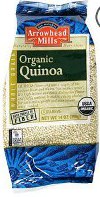Quinoa Is For Everyone – The Benefits Make This Our Favorite Super Food
 One thing that most of us have in common is the desire to feed our kids, and ourselves, nutritious food. But, when faced with the array of choices, it gets confusing. What's good, what's bad… it's not easy to distinguish the difference sometimes. Then you run into something you are totally unfamiliar with – cooking with quinoa. I had to find out more about this.
One thing that most of us have in common is the desire to feed our kids, and ourselves, nutritious food. But, when faced with the array of choices, it gets confusing. What's good, what's bad… it's not easy to distinguish the difference sometimes. Then you run into something you are totally unfamiliar with – cooking with quinoa. I had to find out more about this.
Recently, I've been doing a bit of experimenting with a relatively new food on the market. Even though quinoa has been around for thousands of years, it hasn't hit America's grocery shelves until recently. Over the last few years, quinoa has exploded in cookbooks, cooking shows, and the internet. This 'super-food' is becoming quite popular in many circles; including vegetarian, vegan, weight loss, gluten-free, and fitness diets.
Quinoa is not a grain; it is a seed, a relative of beets, spinach, and Swiss chard. Because it is not a grass or grain, quinoa is considered the perfect food for those with grain, like wheat, sensitivities. The awareness of gluten-free diets may have likely brought quinoa into the limelight. However, quinoa is proving to fit into many diets for a wide range of reasons. Let's take a look at a few benefits that quinoa offers us all:
Protein: Not all foods considered high in protein contain all the essential amino acids in proper proportions for maximum effectiveness in the body, but quinoa does. Quinoa is a complete protein, meaning it contains all essential amino acids in perfect proportions. In fact, quinoa has the same protein quality as milk. For a vegan, or a vegetarian who doesn't drink milk, quinoa is the perfect replacement food. Mix in some black beans in a simple soup or casserole, and you have the ultimate protein-rich super-food.
Minerals: The most concentrated amounts of minerals in quinoa are manganese, magnesium, and phosphorus. With just one serving of quinoa, you will have more than half the RDA of manganese alone, neutralizing those damaging free radicals that are constantly attacking our organs. Along with manganese, quinoa contains high concentrates of magnesium and phosphorous which are both essential minerals aiding in bone health, heart and cardiovascular health, as well as nerve and brain health. Quinoa completes the mineral wheel with ample supplies of calcium, iron, potassium, zinc, copper, and selenium, all vital to our health and well-being.
Vitamins: The highest concentrated vitamin in quinoa is folate. Folate is a B vitamin that is essential for healthy red blood cell development as well as healthy tissue and organ development, most notably during a child's early years. Folate is also believed to fight the destructive cell developments of cancer. Other vitamins that can be found in a good supply in quinoa are vitamin E, thiamin, riboflavin, niacin, and vitamin B6, all essential in the growth, repair, and functioning of vital organs, blood, and tissue.
Dietary Fiber: You probably hear a lot about dietary fiber in advertisements aimed at curing constipation. But, the fact is, dietary fiber i s crucial for all of our body functions. With a whopping 21% RDA in one serving of quinoa, eating a regular diet including this super-food makes sense. Why? Not only does fiber aid the digestive system, it also is known to lower blood cholesterol levels. Studies also show that increasing fiber in your diet will help reduce blood pressure which promotes heart health. A good diet rich in fiber helps control blood sugar levels by slowing the absorption of sugars. Along with these benefits, high-fiber diets also may help with weight loss, due to the fact that foods that are high in fiber and low in calories, like quinoa, fill you up without added calories.
It appears that if you had to choose one food to survive on, quinoa may be your best bet. This super-food contains just about everything a body needs – fiber, vitamins, minerals, healthy fat, carbohydrates, and protein. Add to that the fact that quinoa is low in calories, has zero cholesterol, zero sugars, and is low in sodium, and you've got the perfect food to add to your family's healthy diet.
How do you get more quinoa into your diet?
Rather than looking at quinoa as a substitute for rice or pasta in casseroles and soups, consider quinoa as a main ingredient. Yes, quinoa CAN replace protein in a meal. Just like black beans, quinoa is more than a side dish. Consider replacing a meat dish several times a week with a quinoa dish and enjoy the benefits of this nutrient packed food. Compare these nutrition facts:
Quinoa cooked 1 cup:
Calories from Fat 32; Cholesterol 0mg; Sodium 13mg; Carbs 39g; Dietary Fiber 5g; Protein 8g; Folate 77mcg
Dried Black Beans cooked 1 cup:
Calories from Fat 8; Cholesterol 0mg; Sodium 2mg; Carbs 41g; Dietary Fiber 15g; Protein 15g; Folate 256mcg
Chicken Breast cooked 1 cup:
Calories from Fat 45; Cholesterol 119mg; Sodium 104mg; Carbs 0g; Dietary Fiber 0g; Protein 43g; Folate 6mcg
With these nutrition facts in mind, can you see where quinoa could become a part of your healthy diet? Create meals using quinoa and other nutrient-dense foods and enjoy the benefits of eating well.
To help get you started, here are links to several delicious quinoa based meals:
Classic Stuffed Peppers With Quinoa
Kid-Approved Cheesy Quinoa
Black Bean And Tomato Quinoa Salad
p.s. Learn more about quinoa by clicking on this link: http://healthy.hillbillyhousewife.com/category/quinoa
 And when you're ready to dig even deeper and become a quinoa fanatic, this is the guide for you. It's jam packed with information and recipes to keep you cooking with quinoa for a long, long time. Grab your copy of “The Complete Guide to Cooking With Quinoa” today and start cooking with this super-food for super-nutrition!
And when you're ready to dig even deeper and become a quinoa fanatic, this is the guide for you. It's jam packed with information and recipes to keep you cooking with quinoa for a long, long time. Grab your copy of “The Complete Guide to Cooking With Quinoa” today and start cooking with this super-food for super-nutrition!
To support the blog, check out the HBHW eBooks available on Amazon. Thank you!
Disclosure: Some of the links below are affilate links, meaning, at no additional cost to you, I will earn a commission if you click through and make a purchase.
